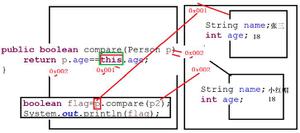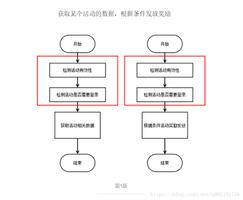李晓菁201771010114《面向对象程序设计(Java)》第十周学习总结

一:理论部分
1.泛型:也称参数化类型(parameterized type),就是在定义类、接口和方法时,通过类型参数指示将要处理的对象类型。(如ArrayList类)。
2.泛型程序设计(Generic programming):编写代码可以被很多不同类型的对象所重用。
3.Pair类引入了一个类型变量T,用尖括号(<>)括起来,并放在类名的后面。
4.泛型类可以有多个类型变量。例如:
public class Pair<T, U> { … }
5.类定义中的类型变量用于指定方法的返回类型以及域、局部变量的类型。
6.泛型方法的声明:泛型方法(1)除了泛型类外,还可以只单独定义一个方法作为泛型方法,用于指定方法参数或者返回值为泛型类型,留待方法调用时确定。
(2)泛型方法可以声明在泛型类中,也可以声明在普通类中。
7.泛型接口的定义:
public interface IPool <T>
{
T get();
int add(T t);
}
8.泛型变量的限定:(1)定义泛型变量的上界:public class NumberGeneric< T extends Number>
上述声明规定了NumberGeneric类所能处理的泛型变量类型,需和Number有继承关系。
extends关键字所声明的上界既可以是一个类,也可以是一个接口。
(2)定义泛型变量的下界:List<? super CashCard> cards = new ArrayList<T>();
下界说明:通过super关键字可以固定泛型参数的类型为某种类型或者其超类。
档程序希望为一个方法的参数限定时,通常可以使用下限通配符。
9.通配符类型:“?”符号标明参数的类型可以是任何一种类型,他和参数T的含义是有区别的,T表示一种未知类型,而?标明任何一种类型。
这种通配符一般有以下三种用法:(1)单独的?:用于表示任何类型。
(2)?extends type:表示带有上界
(3)?super type:表示带有下界
10.pair与pair<?>de区别在于:可以用任意object对象调用原始的pair类的setobject方法。
二:实验部分:
实验十 泛型程序设计技术
实验时间 2018-11-1
1、实验目的与要求
(1) 理解泛型概念;
(2) 掌握泛型类的定义与使用;
(3) 掌握泛型方法的声明与使用;
(4) 掌握泛型接口的定义与实现;
(5)了解泛型程序设计,理解其用途。
2、实验内容和步骤
实验1: 导入第8章示例程序,测试程序并进行代码注释。(以下三个测试程序中的pair类都相同,只需将三个程序定义在同一个包中,即可共用)
测试程序1:(在以下测试程序中,不再赘述主类pair类)
l 编辑、调试、运行教材311、312页 代码,结合程序运行结果理解程序;
l 在泛型类定义及使用代码处添加注释;
l 掌握泛型类的定义及使用。
package pair1;/**
* @version 1.00 2004-05-10
* @author Cay Horstmann
*/
public class Pair<T>//一个pair泛型类,引入一个类型变量T,该类可以有多个类型变量。
{
private T first;//类型变量T指定方法的返回类型以及域和局部变量的类型。
private T second;
public Pair() { first = null; second = null; }
public Pair(T first, T second) { this.first = first; this.second = second; }
public T getFirst() { return first; }
public T getSecond() { return second; }
public void setFirst(T newValue) { first = newValue; }
public void setSecond(T newValue) { second = newValue; }
}
pair
package pair1;/**
* @version 1.01 2012-01-26
* @author Cay Horstmann
*/
public class PairTest1
{
public static void main(String[] args)
{
String[] words = { "Mary", "had", "a", "little", "lamb" };//默认比较ASCII码值
Pair<String> mm = ArrayAlg.minmax(words);//用具体类型替换类型变量T,即可实例化泛型类型。
//通过类名调用方法,该方法为静态的。
System.out.println("min = " + mm.getFirst());
System.out.println("max = " + mm.getSecond());
}
}
class ArrayAlg
{
/**
* Gets the minimum and maximum of an array of strings.
* @param a an array of strings
* @return a pair with the min and max value, or null if a is null or empty
*/
public static Pair<String> minmax(String[] a)//stringPair类对象
{
if (a == null || a.length == 0) return null;
String min = a[0];
String max = a[0];
for (int i = 1; i < a.length; i++)
{
if (min.compareTo(a[i]) > 0) min = a[i];
if (max.compareTo(a[i]) < 0) max = a[i];
}
return new Pair<>(min, max);//两个域可以使用不同的类型
}
}
test1
测试程序2:
l 编辑、调试运行教材315页 PairTest2,结合程序运行结果理解程序;
l 在泛型程序设计代码处添加相关注释;
l 掌握泛型方法、泛型变量限定的定义及用途。
package pair2;import java.time.*;//比较日期的大小调用time包
/**
* @version 1.02 2015-06-21
* @author Cay Horstmann
*/
public class PairTest2
{
public static void main(String[] args)
{
LocalDate[] birthdays =
{
LocalDate.of(1906, 12, 9), // G. Hopper
LocalDate.of(1815, 12, 10), // A. Lovelace
LocalDate.of(1903, 12, 3), // J. von Neumann
LocalDate.of(1910, 6, 22), // K. Zuse
};
Pair<LocalDate> mm = ArrayAlg.minmax(birthdays);//用LocateDate实例化泛型类型
System.out.println("min = " + mm.getFirst());
System.out.println("max = " + mm.getSecond());
}
}
class ArrayAlg
{
/**
Gets the minimum and maximum of an array of objects of type T.
@param a an array of objects of type T
@return a pair with the min and max value, or null if a is
null or empty
*/
public static <T extends Comparable> Pair<T> minmax(T[] a) //为确信有compareTo方法,将T限制为实现Comparable接口,
//加了上界约束的泛型方法
{
if (a == null || a.length == 0) return null;
T min = a[0];
T max = a[0];
for (int i = 1; i < a.length; i++)
{
if (min.compareTo(a[i]) > 0) min = a[i];
if (max.compareTo(a[i]) < 0) max = a[i];
}
return new Pair<>(min, max);
}
}
test2
测试程序3:
l 用调试运行教材335页 PairTest3,结合程序运行结果理解程序;
l 了解通配符类型的定义及用途。
package pair3;/**
* @version 1.01 2012-01-26
* @author Cay Horstmann
*/
public class PairTest3
{
public static void main(String[] args)
{
Manager ceo = new Manager("Gus Greedy", 800000, 2003, 12, 15);
Manager cfo = new Manager("Sid Sneaky", 600000, 2003, 12, 15);
Pair<Manager> buddies = new Pair<>(ceo, cfo);
printBuddies(buddies);
ceo.setBonus(1000000);
cfo.setBonus(500000);
Manager[] managers = { ceo, cfo };
Pair<Employee> result = new Pair<>();//也可用Mannager,因为Employee类是他的父类,在此可直接用它的父类Employee
minmaxBonus(managers, result);
System.out.println("first: " + result.getFirst().getName()
+ ", second: " + result.getSecond().getName());
maxminBonus(managers, result);
System.out.println("first: " + result.getFirst().getName()
+ ", second: " + result.getSecond().getName());
}
public static void printBuddies(Pair<? extends Employee> p)//有上限的通配符,表示它的类型是Employee类
{
Employee first = p.getFirst();
Employee second = p.getSecond();
System.out.println(first.getName() + " and " + second.getName() + " are buddies.");
}
public static void minmaxBonus(Manager[] a, Pair<? super Manager> result)//有下限的通配符,表明它的下限是Manager类
{
if (a.length == 0) return;
Manager min = a[0];
Manager max = a[0];
for (int i = 1; i < a.length; i++)
{
if (min.getBonus() > a[i].getBonus()) min = a[i];
if (max.getBonus() < a[i].getBonus()) max = a[i];
}
result.setFirst(min);
result.setSecond(max);
}
public static void maxminBonus(Manager[] a, Pair<? super Manager> result)
{
minmaxBonus(a, result);
PairAlg.swapHelper(result); // OK--swapHelper captures wildcard type
}
// Can't write public static <T super manager> ...
}
class PairAlg
{
public static boolean hasNulls(Pair<?> p)//pair<?>,表示可以用任何Object对象调用原始的pair类的setobject方法。
{
return p.getFirst() == null || p.getSecond() == null;
}
public static void swap(Pair<?> p) { swapHelper(p); }
public static <T> void swapHelper(Pair<T> p)
{
T t = p.getFirst();
p.setFirst(p.getSecond());
p.setSecond(t);
}
}
test3
package pair3;public class Manager extends Employee//mannager作为一个子类继承自它的父类Employee
{
private double bonus;
/**
@param name the employee's name
@param salary the salary
@param year the hire year
@param month the hire month
@param day the hire day
*/
public Manager(String name, double salary, int year, int month, int day)
{
super(name, salary, year, month, day);//super调用超类中的一些方法
bonus = 0;
}
public double getSalary()
{
double baseSalary = super.getSalary();
return baseSalary + bonus;
}
public void setBonus(double b)
{
bonus = b;
}
public double getBonus()
{
return bonus;
}
}
Manager
package pair3;import java.time.*;
public class Employee//Employee类
{
private String name;
private double salary;
private LocalDate hireDay;
public Employee(String name, double salary, int year, int month, int day)
{
this.name = name;
this.salary = salary;
hireDay = LocalDate.of(year, month, day);
}
public String getName()
{
return name;
}
public double getSalary()
{
return salary;
}
public LocalDate getHireDay()
{
return hireDay;
}
public void raiseSalary(double byPercent)
{
double raise = salary * byPercent / 100;
salary += raise;
}
}
Employee
实验2:编程练习:
编程练习1:实验九编程题总结
l 实验九编程练习1总结(从程序总体结构说明、模块说明,目前程序设计存在的困难与问题三个方面阐述)。
总结:(1)该程序有两个类构成,一个主类,
package text8;import java.io.BufferedReader;
import java.io.File;
import java.io.FileInputStream;
import java.io.FileNotFoundException;
import java.io.IOException;
import java.io.InputStreamReader;
import java.util.ArrayList;
import java.util.Arrays;
import java.util.Collections;
import java.util.List;
import java.util.Scanner;
public class Xinxi {
private static ArrayList<Student> studentlist;
public static void main(String[] args) {
studentlist = new ArrayList<>();
Scanner scanner = new Scanner(System.in);
File file = new File("D:\\身份证号\\身份证号.txt");
try {
FileInputStream fis = new FileInputStream(file);
BufferedReader in = new BufferedReader(new InputStreamReader(fis));
String temp = null;
while ((temp = in.readLine()) != null) {
Scanner linescanner = new Scanner(temp);
linescanner.useDelimiter(" ");
String name = linescanner.next();
String number = linescanner.next();
String sex = linescanner.next();
String age = linescanner.next();
String province = linescanner.nextLine();
Student student = new Student();
student.setName(name);
student.setnumber(number);
student.setsex(sex);
int a = Integer.parseInt(age);
student.setage(a);
student.setprovince(province);
studentlist.add(student);
}
} catch (FileNotFoundException e) {//添加的异常处理语句try{ }catch{ }语句
System.out.println("所找信息文件找不到");
e.printStackTrace();
} catch (IOException e) {
System.out.println("所找信息文件读取错误");//采取积极方法捕获异常,并将异常返回自己所设定的打印文字
e.printStackTrace();
}
boolean isTrue = true;
while (isTrue) {
System.out.println("选择你的操作,输入正确格式的选项");
System.out.println("1按姓名字典序输出人员信息");
System.out.println("2.查询最大和最小年龄的人员信息");
System.out.println("3.寻找老乡");
System.out.println("4.寻找年龄相近的人的信息");
System.out.println("5.退出");
String n = scanner.next();
switch (n) {
case "1":
Collections.sort(studentlist);
System.out.println(studentlist.toString());
break;
case "2":
int max = 0, min = 100;
int j, k1 = 0, k2 = 0;
for (int i = 1; i < studentlist.size(); i++) {
j = studentlist.get(i).getage();
if (j > max) {
max = j;
k1 = i;
}
if (j < min) {
min = j;
k2 = i;
}
}
System.out.println("年龄最大:" + studentlist.get(k1));
System.out.println("年龄最小:" + studentlist.get(k2));
break;
case "3":
System.out.println("家乡在哪里?");
String find = scanner.next();
String place = find.substring(0, 3);
for (int i = 0; i < studentlist.size(); i++) {
if (studentlist.get(i).getprovince().substring(1, 4).equals(place))
System.out.println("同乡" + studentlist.get(i));
}
break;
case "4":
System.out.println("年龄:");
int yourage = scanner.nextInt();
int near = agenear(yourage);
int value = yourage - studentlist.get(near).getage();
System.out.println("" + studentlist.get(near));
break;
case "5":
isTrue = false;
System.out.println("退出程序!");
break;
default:
System.out.println("输入有误");
}
}
}
public static int agenear(int age) {
int j = 0, min = 53, value = 0, flag = 0;
for (int i = 0; i < studentlist.size(); i++) {
value = studentlist.get(i).getage() - age;
if (value < 0)
value = -value;
if (value < min) {
min = value;
flag = i;
}
}
return flag;
}
}
xinxi
一个student类,该类实现了一个接口。
package text8;public class Student implements Comparable<Student> {
private String name;
private String number;
private String sex;
private String province;
private int age;
public void setName(String name) {
// TODO 自动生成的方法存根
this.name = name;
}
public String getName() {
// TODO 自动生成的方法存根
return name;
}
public void setnumber(String number) {
// TODO 自动生成的方法存根
this.number = number;
}
public String getNumber() {
// TODO 自动生成的方法存根
return number;
}
public void setsex(String sex) {
// TODO 自动生成的方法存根
this.sex = sex;
}
public String getsex() {
// TODO 自动生成的方法存根
return sex;
}
public void setprovince(String province) {
// TODO 自动生成的方法存根
this.province = province;
}
public String getprovince() {
// TODO 自动生成的方法存根
return province;
}
public void setage(int a) {
// TODO 自动生成的方法存根
this.age = age;
}
public int getage() {
// TODO 自动生成的方法存根
return age;
}
public int compareTo(Student o) {
return this.name.compareTo(o.getName());
}
public String toString() {
return name + "\t" + sex + "\t" + age + "\t" + number + "\t" + province + "\n";
}
}
student
(2)在该程序中添加异常处理语句。采用积极抛出异常的模式,处理程序中可能会出现的异常。
(3)目前程序设计存在的困难是,可以将一个模块一个模块的写出来,但不知道该怎么将这些模块组织起来成一个完整的程序。
还有在程序运行结果出现一些不该出现的符号时,不知道该如何准确的修改。
l 实验九编程练习2结(从程序总体结构说明、模块说明,目前程序设计存在的困难与问题三个方面阐述)。
总结:(1)该程序有两个类构成,一个主类,
package 第九周;import java.util.Random;
import java.util.Scanner;
import java.io.FileNotFoundException;
import java.io.PrintWriter;
public class Demo {
public static void main(String[] args) {
// 用户的答案要从键盘输入,因此需要一个键盘输入流
//Scanner in = new Scanner(System.in);
yunsuan counter = new yunsuan ();
PrintWriter out = null;
try {
out = new PrintWriter("D:\\text.txt");
} catch (FileNotFoundException e) {
// TODO Auto-generated catch block
e.printStackTrace();
}
int sum = 0;
// 通过循环生成10道题
for (int i = 0; i < 10; i++) {
int a = (int) Math.round(Math.random() * 10);
int b = (int) Math.round(Math.random() * 10);
Scanner in1 =new Scanner(System.in);
switch((int)(Math.random()*4))
{
case 1:
System.out.println( ""+a+"+"+b+"=");
int c1 = in1.nextInt();
out.println(a+"+"+b+"="+c1);
if (c1 == counter.add(a, b)) {
sum += 10;
System.out.println("恭喜答案正确");
}
else {
System.out.println("抱歉答案错误");
}
break ;
case 2:
System.out.println(i + ": " + a + "-" + b + "=");
int c2 = in1.nextInt();
out.println(a + "-" + b + "=" + c2);
if (c2 == counter.reduce(a, b)) {
sum += 10;
System.out.println("恭喜答案正确");
} else {
System.out.println("抱歉答案错误");
}
break;
case 3:
System.out.println(i + ": " + a + "*" + b + "=");
int c3 = in1.nextInt();
out.println(a + "*" + b + "=" + c3);
if (c3 == counter.multiplication(a, b)) {
sum += 10;
System.out.println("恭喜答案正确");
} else {
System.out.println("抱歉答案错误");
}
break;
case 4:
System.out.println(""+a+"/"+b+"=");
while(b==0)
{ b = (int) Math.round(Math.random() * 100);
}
int c4= in1.nextInt();
out.println(a+"/"+b+"="+c4);
if (c4 == counter.devision(a, b)) {
sum += 10;
System.out.println("恭喜答案正确");
}
else {
System.out.println("抱歉答案错误");
}
break;
}
}
System.out.println("总分:"+sum);
out.println(sum);
out.close();
}
}
demo
一个用户自定义类
package 第九周;public class yunsuan {
public int multiplication(int a, int b) {
// TODO 自动生成的方法存根
return a*b;
}
public int add(int a, int b) {
// TODO 自动生成的方法存根
return a+b;
}
public int reduce(int a, int b) {
// TODO 自动生成的方法存根
if((a-b)>0)
return a-b;
else
return 0;
}
public int devision(int a, int b) {
// TODO 自动生成的方法存根
if(b!=0)
return a/b;
else
return 0;
}
}
yunsuan
(2)存在的困难是,有些运算超出小学生的计算范围,当回答正确时,会生成10道四则运算习题,当有一个回答不正确时,生成的四则运算习题不是十道。
将生成的十道四则运算题目保存在txt文档中。
编程练习2:采用泛型程序设计技术改进实验九编程练习2,使之可处理实数四则运算,其他要求不变。
package 第九周;import java.util.Random;
import java.util.Scanner;
import java.io.FileNotFoundException;
import java.io.PrintWriter;
public class Demo {
public static void main(String[] args) {
// 用户的答案要从键盘输入,因此需要一个键盘输入流
Scanner in = new Scanner(System.in);
yunsuan counter = new yunsuan ();
PrintWriter out = null;
try {
out = new PrintWriter("D:\\text.txt");
} catch (FileNotFoundException e) {
// TODO Auto-generated catch block
e.printStackTrace();
}
int sum = 0;
// 通过循环生成10道题
for (int i = 0; i < 10; i++) {
int a = (int) Math.round(Math.random() * 100);
int b = (int) Math.round(Math.random() * 100);
//Scanner in1 =new Scanner(System.in);
Random rand=new Random();
switch((int)(Math.random()*4)+1)
{
case 1:
System.out.println( ""+a+"+"+b+"=");
int c= in.nextInt();
out.println(a+"+"+b+"="+c);
if (c == counter.add(a, b)) {
sum += 10;
System.out.println("恭喜答案正确");
}
else {
System.out.println("抱歉答案错误");
}
break ;
case 2:
while (a<b) {
b = (int)Math.round(Math.random() * 100); ;
}
System.out.println(i + ": " + a + "-" + b + "=");
int c1 = in.nextInt();
out.println(a + "-" + b + "=" + c1);
if (c1 == counter.reduce(a, b)) {
sum += 10;
System.out.println("恭喜答案正确");
} else {
System.out.println("抱歉答案错误");
}
break;
case 3:
System.out.println(i + ": " + a + "*" + b + "=");
int c2 = in.nextInt();
out.println(a + "*" + b + "=" + c2);
if (c2 == counter.multiplication(a, b)) {
sum += 10;
System.out.println("恭喜答案正确");
} else {
System.out.println("抱歉答案错误");
}
break;
case 4:
a = b + (int) Math.round(Math.random() * 100);
while(b==0)
{ b = (int) Math.round(Math.random() * 100);
}
while (a%b==0) {
a= (int) Math.round(Math.random() * 100);
}
System.out.println(""+a+"/"+b+"=");
int c3= in.nextInt();
out.println(a+"/"+b+"="+c3);
if (c3 == counter.devision(a, b)) {
sum += 10;
System.out.println("恭喜答案正确");
}
else {
System.out.println("抱歉答案错误");
}
break;
}
}
System.out.println("总分:"+sum);
out.println(sum);
out.close();
}
}
demo
package 第九周;public class yunsuan<T>{
private T a;
private T b;
public yunsuan() {
a=null;
b=null;
}
public int multiplication(int a, int b) {
// TODO 自动生成的方法存根
return a*b;
}
public int add(int a, int b) {
// TODO 自动生成的方法存根
return a+b;
}
public int reduce(int a, int b) {
// TODO 自动生成的方法存根
if((a-b)>0)//保证两数相减不会是负数
return a-b;
else
return 0;
}
public int devision(int a, int b) {
// TODO 自动生成的方法存根
if (b != 0 && a%b==0)//保证是整除
return a/b;
else
return 0;
}
}
yunsuan
三:实验总结:通过本周的学习,掌握了泛型类的定义,以及泛型方法的声明,还有泛型接口的定义,以及对泛型变量的限定。
但在用泛型类写程序时还是有一点点的困难。在学长的指导帮助下学会了如何阅读别人的程序,并用快捷方法进入某一个类去读它的定义。
以上是 李晓菁201771010114《面向对象程序设计(Java)》第十周学习总结 的全部内容, 来源链接: utcz.com/z/394211.html








